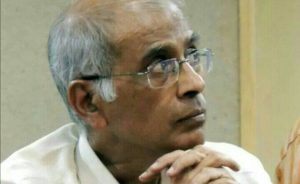


Dr Narendra Dabholkar
On 23 August 2013, leading anti-superstition campaigner, Narendra Dabholkar, was shot and killed in Pune, Maharashtra state, by two men on a motorcycle.
History of the case
2021
In March 2021, the Bombay High Court asked the Central Bureau of Investigation for a progress report on its investigation into Dabholkar’s murder. At the end of the month, the CBI confirmed it was ready to go to trial.
2020
Almost seven years since his murder, the trial of the accused had still not commenced. In February 2020, the Bombay High Court expressed concern at the delay.
2019
In May 2019, two further individuals were arrested in connection with their alleged involvement in Dabholkar’s murder. The men are reported to have links to Sanatan Sanstha – a Hindu-nationalist group. To date, six individuals have been charged in connection with the crime. Several of those accused have also been implicated in the murders of other rationalist thinkers killed in the same period.
2018
In August 2018, the Central Bureau of Investigation (CBI) reportedly arrested a man accused of being one of the shooters of Dabholkar.
According to The Print, “In its charge sheet in 2016, the central agency named Sanatan Sanstha members Sarang Akolkar and Vinay Pawar as the two people who shot Dabholkar. But in August 2018, it arrested Sachin Prakashrao Andure and Sharad Kalaskar and told the court that these two had opened fire on Dabkholar. “
2017
In 2017, the state of Karnataka passed the ‘Karnataka Prevention and Eradication of Inhuman Evil Practices and Black Magic Bill,’ an anti-superstition bill, under pressure from civil society groups following the murders of Dr Dabholkar and Dr Kalburgi.
2013
On 20 August 2013, Dabholkar was shot and killed by two men on a motorcycle. The murder came just days after the state government pledged to re-introduce an anti-superstition bill, aimed at making it an offence to exploit or defraud people with ‘magical’ rituals, charms and cures. This bill was closely associated with Dabholkar’s work, and was opposed by many right-wing and Hindu nationalist groups who labelled it “anti-Hindu”. The anti-superstition bill was passed into law soon after Dabholkar’s assassination.
Background information
Dabholkar was a long-time activist in India’s rationalist movement, founder-president of Maharashtra Andhashraddha Nirmoolan Samiti (MANS), an anti-superstition organization, and a leader of the Federation of Indian Rationalist Association, a member organization of Humanists International.
Country background
India is the world’s most populous democracy, religiously pluralistic, and for many years proud, in the main, of its secular Constitution.
Despite its famously secular Constitution, concerns about Hindu nationalism and interreligious tension have risen under the premiership of Narendra Modi. Modi’s presidency has been linked to a rise in Hindu nationalism — both socially and on the part of officials appearing to elevate and promote a politicized Hindu nationalist agenda. Several state or federal laws introduced by the ruling Bharatiya Janata Party (BJP) have been designed to promote patriotism or Hindu national identity in particular. Along with a rise in Hindu nationalist rhetoric and state-sponsored religious fundamentalism these developments have sparked deep concern for minorities and their right to freedom of religion and belief.
Rationalism as a belief has a long and proud history throughout Indian culture; since the 6th century BCE. According to the 2012 WIN-Gallup Global Index of Religion and Atheism report, 81% of Indians were religious, 13% were non-religious, 3% were convinced atheists and 3% were unsure or did not respond.
Between 2013 and 2015, three prominent rationalists were assassinated apparently because of their work combating superstition or Hindu nationalism. The authorities were quick to promise action, but were also accused of prematurely ruling out links to Hindu nationalist extremist groups. Government officials refrained from forcefully condemning the killings. Whilst India’s Minister for Minorities, Mukhtar Abbas Naqvi, has said that “you cannot judge the government with isolated incidents of violence or isolated statements by some ministers,” this violence has happened against a backdrop of a number of BJP politicians making deeply derogatory remarks about minorities — including, Niranjan Jyoti implying that non-Hindus were bastards by telling attendees at a rally that they would have to decide between a government led by ‘sons of Ram or by bastards’.
Humanists International’s concerns and calls
Humanists International believes that Narendra Dabholkar was killed in retaliation for his work countering superstition. The organization remains concerned by the delays in the investigation and calls on the authorities to bring all those implicated in his murder to justice.
